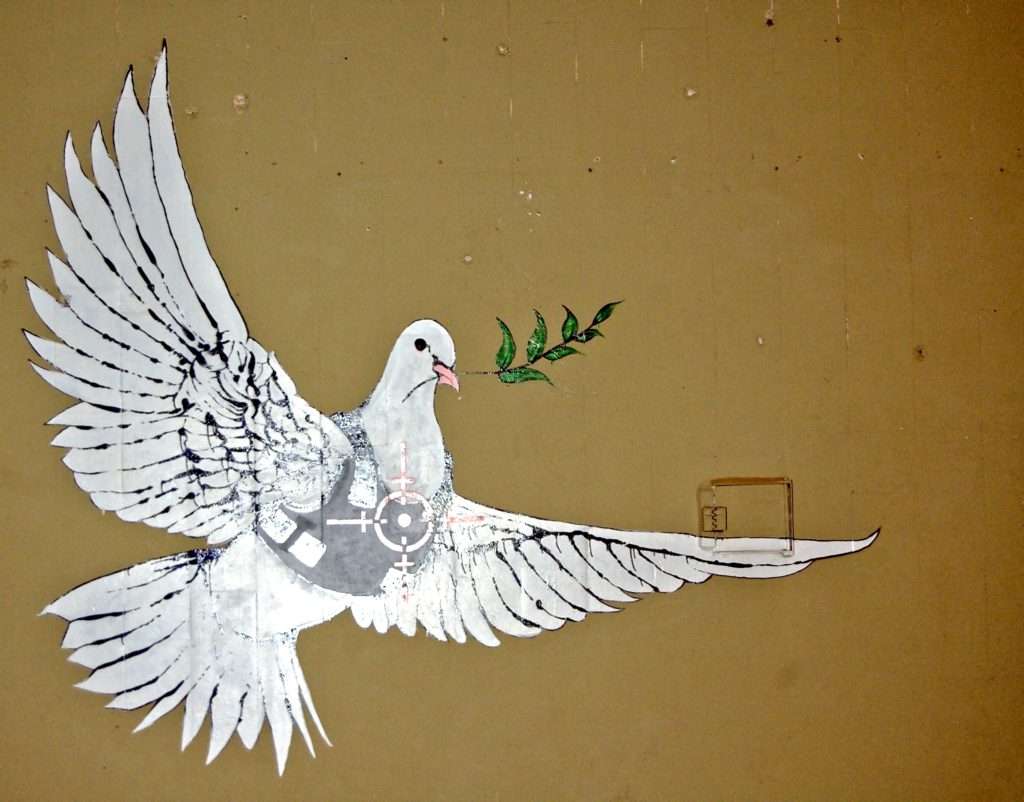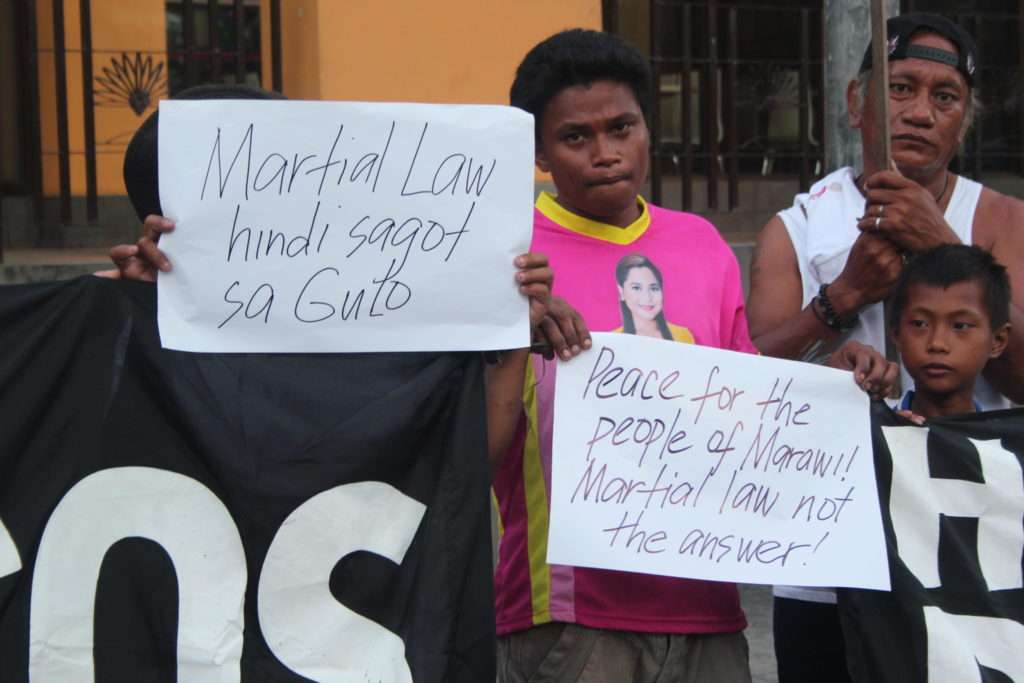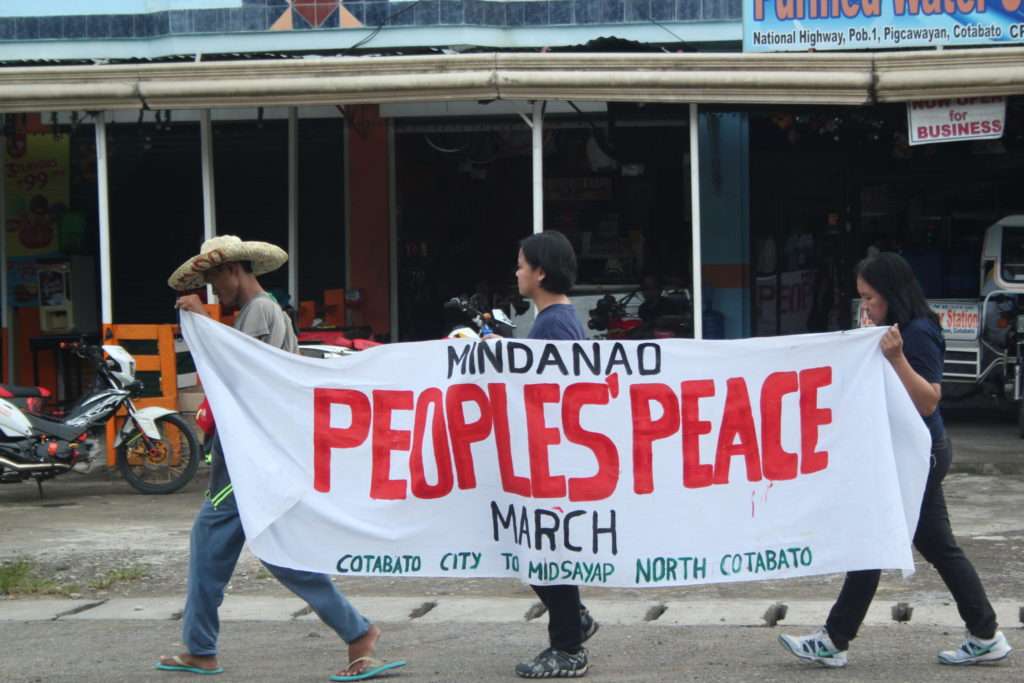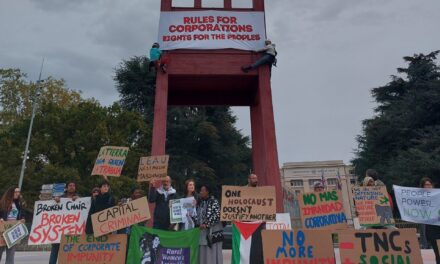
Armoured Dove of Peace. Graffiti art by Banksy; photo by Pawel Ryszawa. Retrieved from English Wikipedia (https://commons.wikimedia.org/wiki/File:Banksy_-_Peace_Dove_-_2008-03_-_close-up.jpg), https://creativecommons.org/licenses/by-sa/4.0/legalcode
By Galileo de Guzman Castillo
Halina’t ating pag-usapan ang kapayapaan (Come, let us talk about peace)
Suriin ang ugat ng digmaan (Analyze the roots of the conflict)
Kamtin ang kapayapaan (Achieve peace)
—“Kapayapaan”, TUBAW (Tubong Mindanao, Tulong Mindanao)
This article is the product of a series of conversations with Focus on the Global South’s allies and networks working on the issues of peace, security, and development. In this issue, a particular focus is given to Mindanao. The author speaks with members of the Mindanao Peoples’ Peace Movement (MPPM), a Mindanao-wide coalition of grassroots and tri-peoples (migrant settlers, indigenous peoples, and Bangsamoro) organizations. Three years since the coming to power of Rodrigo Duterte—the first president from Southern Philippines—the path towards just and lasting peace remains elusive; bogged down by the lack of a clear, inclusive, and participatory framework on peace. The tri-peoples of Mindanao continue to suffer from poverty, human rights violations, displacement, dispossession of their lands, and persisting injustice. These provided the entry points for extremism to take over as the peace talks dragged on and the cycle of frustration, fuelled by unresolved conflicts and historical grievances, continues on and on. The imposition of martial law, militarization of communities, demonization of human rights,[i] and further entrenchment of neoliberalism in the economic and development agenda pose additional questions and concerns about the direction the Duterte administration is veering towards in addressing the roots of the conflicts and achieving “kalinaw”—one that is not only about eliminating wars and armed conflicts but also involves the struggle for social and environmental justice, equality, and sustainable development. “Kalinaw” or “peace” does not only pertain to the peace talks between the government and the rebel groups; it is intertwined with the struggles for the right to self-determination and promotion of peoples’ alternatives. The first quarter of 2019 saw the concrete expression of the right to choose one’s political destiny, as more than 1.7 million people partook in the Bangsamoro Organic Law (BOL) plebiscites. After drawing the support of 88.57% of the electorate, the BOL was finally ratified after years of peace negotiations—creating the Bangsamoro Autonomous Region in Muslim Mindanao (BARMM) and replacing the “failed experiment” of the Autonomous Region in Muslim Mindanao (ARMM). The Bangsamoro Transition Authority (BTA), led by the Moro Islamic Liberation Front (MILF), is now up to the task of building the foundations of the BARMM and fulfilling the promises envisioned in the BOL of a more inclusive, participatory, responsive, and accountable government as it serves its 3-year term until the election and constitution of the Bangsamoro Parliament in 2022. However, red flags were raised on how representative the composition of the BTA is and how the process of appointing the interim leaders unfolded. Ultimately, just and lasting peace will only be attained by putting the people at the heart of the issue—through grassroots education, community empowerment, genuine consultations, inclusive talks, participatory processes, democratic governance, and tri-peoples solidarities.
Important note: The views and opinions expressed in this conversation are solely those of the individuals involved, in their personal capacity as peacebuilders and human rights defenders, and do not represent the positions of the entire coalition. Contributors:
(Galil) Galileo de Guzman Castillo, Focus on the Global South
(Janel) Janel Pesons, MPPM Secretary General
(Mark) Mark Lester Mandar, MPPM Council of Peoples’ Representatives – Youth
(Cio) Titay Bleyen Leticio Datuwata, MPPM Deputy Secretary General – Katawhang Lumad
(Mabel) Mabel Carumba, MPPM Vice-Chair – Katawhang Migrante
Galil: What is your assessment of the current administration’s policies and the government’s overall direction on the issue of peace and Mindanao?
Janel: Given the non-existent policy and unclear framework on peace, not only in the present administration but also in the previous ones, there have been different ways of resolving the issue. During the presidency of Joseph Estrada in 2000, the approach was “all-out war” against the MILF. Even 19 years after his declaration, the struggle of Moros for their right to self-determination continues. Ironically, the revolution was sustained, even more than the costly ₱6-billion military campaign.[ii] The succeeding president, Gloria Macapagal-Arroyo, reversed the campaign to “all-out peace”—although the direction of the peace process was not clear as there was no overarching peace framework. The on-and-off peace talks were stalled and eventually there were renewed armed conflicts. Then, the Maguindanao massacre happened in 2009 and Arroyo placed the entire province under a state of martial law. During the time of Benigno Aquino III, there were indications that the peace process was going smoothly but this was tarnished by the Mamasapano incident that resulted in the deaths of the SAF44 soldiers, which not only jeopardized the peace process between the Philippine government and the MILF but also resulted to the non-passage of the Bangsamoro Basic Law (BBL). Now, in Rodrigo Duterte’s administration, people are not able to participate fully and meaningfully in the peace processes. Out of fear, they are not able to voice their concerns and demands. Even though the BOL was signed into law under the current administration—the plebiscites already concluded and the BTA constituted—the issue of peace remains problematic with the declaration of martial law in the entire Mindanao and the way the government handled the Marawi crisis.
Mabel: The MILF pinned their hopes on the Duterte administration for the BBL to be passed as they relied on the popularity and the populist rhetoric of the President. Their thinking was that this would be the last chance for the realization of the peace process. For them, the BBL could be a way to reduce the cases of extremism in the communities. However, while the government and the MILF were realizing the peace process through the BBL plebiscites on one hand, it also continued the militarization of Moro communities on the other hand.
Mark: Instead of the issues being resolved, the situation has deteriorated. There are many accounts that this has emboldened more extreme tendencies, especially among the youth. The recruitment to join extremist groups is rampant because of the continuing and unresolved frustrations. Different splinter groups arose from the mounting dissatisfaction with the peace processes.
Mabel: The issue of extremism will always be there as long as communities remain in dire poverty. Extremism is winning the ideological fight among the youth as they become vulnerable due to lack of education, having no access to justice, and their grievances not being addressed. But this is not only common among Muslim communities; this is also true of other communities in Mindanao, including Christians. It is a common misconception that religious fundamentalism only pertains to Islam; we also have a lot of Christian fundamentalists in our midst. In 2008, some of the Christian communities were used by politicians, arming them to fight against the Muslims during the time when the Memorandum of Agreement on Ancestral Domain (MOA-AD) between the Government of the Republic of the Philippines (GRP) and the MILF was almost coming into fruition. I also want to point out that the issue of extremism is not only ideological; it is a reflection of the failure to address the basic needs and the fulfilment of the peoples’ rights.
Galil: Perhaps the war that erupted in Marawi, just a year into Duterte’s presidency, was a defining moment where the frustrations and disaffection with the peace processes became starkly manifested. As a response, Duterte declared martial law on the entire Mindanao and to date, the order has not been lifted—with Congress approving its extension and re-extensions and with the Supreme Court ruling that it is valid and legal. How is the imposition of martial law on the entire Mindanao Island being viewed?
Janel: At the outset, there was still sympathy among the Christian communities on the plight of the Maranaos. But later on, for instance in Iligan City which is Christian-dominated, you would hear other people say “it was their fault, because they are evil people.” It is easier for the peace spoilers to highlight the issue of religion to trigger conflicts. Moro and Christian biases and prejudice against each other remain strong. A deplorable aftermath of all of this is that communities were made to believe that martial law is OK as a response, as it supposedly made their communities safer and more peaceful. The people were not made aware of the dangers of curtailing civil liberties and rights. Organized groups felt the direct impact of not being able to freely convene meetings and move from one community to another.
Mark: If you ask the people why they are supporting the draconian measure, it is because for them it deters criminality and drug trafficking. But if you look more closely, it becomes apparent that the solution to such problems do not necessitate the imposition of martial law. These problems are an accumulation of the frustrations at the failures and inability of the past and present administrations and the democratic institutions to carry out reforms at the local level—and martial law is being offered as a panacea.
Cio: It also led to the suspension of the Writ of Habeas Corpus.[iii] In effect, those critical of the administration now face increasing and intensifying threats under the despotic rule.
Mabel: Many Lumad communities were red-tagged as members of the New People’s Army (NPA). Many were militarized and included in the list of declared terrorists by the government, putting their lives in jeopardy as they do not have immediate and direct access to legal remedies. Those in the remote areas suffer tremendously from illegal searches, warrantless arrests, planting of fake evidence—and many of them were imprisoned for alleged involvement in terror organizations.

“The dominant elites consider the remedy to be more domination and repression, carried out in the name of freedom, order, and social peace (that is, the peace of the elites).” —Paulo Freire, Pedagogy of the Oppressed. Quezon City, Philippines. 2017 May 23. Photo by Galileo de Guzman Castillo.
Galil: A hard lesson we learned from the Marcos dictatorship is that authoritarian, militaristic, and totalitarian regimes can never and will never bring just and lasting peace. Concretely, what should the government do to address the cycle of frustration? What policies should be passed? What approaches should be used?
Janel: Definitely, Duterte’s militarist approach in resolving the issue of terrorism did not and will not lead to a just and lasting peace in Mindanao. Many of the local people and civil society have already said that the approach is not appropriate and that the government could have utilized existing traditional approaches in resolving conflicts rather than resorting to the scorched-earth strategy that wiped out the entire city of Marawi. The Maranaos, for instance, have their own approach through social dialogue. Actual experiences affirm that this approach brought sustained peace in their communities. The rehabilitation plan for Marawi is also problematic as it aims to establish economic zones and develop the city as a tourism destination and military reserve rather than to address the needs and respond to the wishes of the affected Maranaos. Two years after the Marawi siege, nothing concrete has come out of the Task Force Bangon Marawi plan; progress in the rehabilitation, recovery, and reconstruction efforts has been very slow. In the first place, the Maranaos were not consulted and included in the rehabilitation plan. Cultural sensitivities were not considered. The government’s program to put up casinos, ports, and tourist sites is not in accord with the culture of Marana
Cio: There will be no just and lasting peace if the traditional approaches, customary laws and practices, political structures and governance systems, and the rights of the tri-people are not recognized and respected.
Mark: There should be a clear mechanism, framework, and policy agenda on peace. Something that would serve as the foundation and basis of the direction that the current and succeeding governments would follow so that the end of a president’s term after six years would not mean the end of the peace processes as well.
Galil: Speaking of a framework for just and lasting peace, many celebrated the passage into law of the BOL under the current administration. Years of community consultations, peace talks, and legislative sessions finally paved the way for the establishment of the BARMM.
Cio: Indeed, many touted the BOL as a peace instrument—but it would not be one if it did not include our rights. Since the very beginning, we asserted that the aspirations should be towards an inclusive BOL that would lead to peace for all peoples in Mindanao. That is why we lobbied in Congress for the explicit inclusion in the BOL of IPRA or the Indigenous Peoples’ Rights Act—a national law which sets the minimum standards of recognition of indigenous peoples’ rights. Ever since it was signed into law in 1997, it has never been implemented in the ARMM. We hope that it would be a different story in the BARMM.
Mabel: The results of the BOL plebiscite gave credence and legitimacy to the struggle for the right to self-determination of the Bangsamoro. The BARMM could be a potential platform or arena for peoples’ participation in good governance. The MILF should extend goodwill and sincerity to all the stakeholders by listening to the needs and aspirations of the people. However, there are many challenges that the MILF is facing at the moment. For instance, the BTA was already compromised as it depended on the appointees of the President and many were products of negotiations between traditional politicians and political clans.
Galil. It must be noted that the Moro National Liberation Front (MNLF) was not happy with the outcome of the BOL, especially the BTA appointments. According to Yasmira Moner of the Mindanao State University-Iligan Institute of Technology, “some Moro leaders, for example, decry the ‘tyranny of the MILF’ in the MILF-led BTA, leaving other Moro groups such as the MNLF disenfranchised in this transition period before the 2022 elections.”[iv]
Mark: Hopefully, in the struggle of our Moro brothers and sisters for their right to self-determination, more and more progressive groups and civil society will induce the Bangsamoro government to be more democratic—putting a high premium on genuine peoples’ participation and ensuring that democratic processes will be institutionalized within the autonomous region. It is imperative that the struggle for self-determination will not be corrupted and swallowed by the very system in place and that there will be no concentration of economic opportunities in certain individuals and groups, including political dynasties. The Bangsamoro should be able to transcend its leaders’ revolutionary character and clannish nature and strive to move towards greater democratization, and to address questions and concerns on the kind of economic system that would prevail.
Galil: The Bangsamoro Development Plan appears to be a push for neoliberalism to be further embedded in Mindanao’s social, political, and economic systems. It will open up the indigenous peoples’ ancestral domains for private investments and corporate and state extractivism, supposedly to promote “inclusive” growth, stability, and job generation. There are apprehensions that the BARMM will become an arena for aggressive investments and “development.”
Cio: Duterte, himself, declared last year that he will search for investors for our ancestral domains. He said that the government worked hard in “giving” us our ancestral domain but the problem, according to him, is that we are not using it efficiently. What he failed to understand is that our view on development is different from that of the business and investment sector. We do not want the entry of plantation, mining, and other extractive activities in our homelands.
Janel: The issue of territory is very sensitive and there is a lot to consider, including political and economic interests. In 2008, the Supreme Court declared as unconstitutional the MOA-AD, triggering armed conflicts in Lanao del Norte and Lanao del Sur. Unfortunately, the process was kept secret, or at least hidden from public scrutiny until it was belatedly opened up. People were taken aback that without their knowledge they were suddenly made parties to the then proposed Bangsamoro Juridical Entity. The negative sentiments brought about by the non-transparency of the process were also fuelled by the mistrust and prejudices of the Moro and Christian communities towards each other. Today, with the BOL signed into law under this administration, a key question is being raised: How would the aspirations and promises of the BOL bear out on the ground?
Mabel: It rests upon the shoulders of the MILF to win over the other insurgent groups and involve them in the process of building the BARMM. Now is the opportune moment that the BTA be opened up for real and genuine community consultations as to what the Bangsamoro peoples truly aspire and struggle for and how to be responsive to their needs. The realization of the Bangsamoro struggle was not attained through armed revolution alone but through different forms. While it is true that many combatants have lost their lives in the struggle, there are also countless civilians who were displaced and tried to keep their families and communities together despite the recurring violence and conflict.
Mark: If we look back at the history of the Bangsamoro, they had no voice at the national level for the longest time, and this situation did not change throughout the years of changes in leadership at the local and national level.
Galil: The Philippine midterm elections are just around the corner and it would be a most opportune time to select and elect new leaders that will work towards the realization of the aspirations and hopes of the people for a just and lasting peace. While the Commission on Elections recently declared the entire island of Mindanao as an election hotspot, what actions can we take to advance the progressive agenda on peace and Mindanao?
Mark: Elections in Mindanao are very frustrating; vote buying is rampant, cheating by traditional politicians is always there, politicians are running under dubious platforms, and political dynasties wield a strong grip on the electorate. Information gaps, especially with the remote communities, remain a big problem. How can you talk about crucial electoral issues like the push for a kind of federalism and charter change that will further entrench neoliberalism, the re-extensions of martial law in Mindanao, the creeping authoritarianism and moves toward full-blown dictatorship—if the electorate are not aware and do not understand basic concepts such as human rights?
Janel: Duterte remains popular among Mindanaoans. Candidates from the opposition parties would need to work doubly hard to wrest a significant slice of the Mindanao vote. But moreso for Bangsamoro candidates, where the strong Christian biases against the Moro community will prevail and block support for them. Nonetheless, I still do my part as a community organizer, grassroots educator, and human rights defender to educate and empower communities and help them understand the importance of the upcoming midterm elections.
Mabel: The “rooting process” is important—we need go back to our communities, organize, have open discussions on issues affecting us, collectively study and learn together—so that the people can make informed decisions, come up with their common agenda, be empowered to articulate and demand for the realization of this agenda, and be part of the political decision making process and later on make the leaders accountable.
Cio: If the pro-administration candidates win this coming election, the path towards charter change and federalism will be thrown wide open. Grassroots discussions on key policy issues should also be done to empower the communities and enable them to articulate their perspectives from the ground. These voices should be amplified at the national level, not only during the election period but also beyond.
Galil: Beyond the elections, what can we do? How do we collectively move forward? And towards what?
Mark: Going through the peace process should not be the “end goal”. In fact, development should be tackled alongside the pursuit of peace. From the very beginning of the peace process, the demands and socioeconomic needs of the communities should have been addressed.
Mabel: We should build sustainable communities that can transform conflicts positively, for instance, by reinforcing community-based conflict resolution mechanisms, encouraging initiatives that will allow communities to collaborate with each other, and solidifying social cohesion and solidarity.
Janel: What we have advocated for ever since is the importance of community consultations; that the peoples’ dreams, aspirations, hopes, and demands be heard and included in all the high-level dialogues, meetings, and negotiations. Consultations should not be “for your information” only and there must be an opportunity for the people to be genuinely involved in the processes. An example of this is the Independent Indigenous Peoples Voice (IIPV)[v] that provides a space where the indigenous peoples are able to articulate their own hopes, dreams, aspirations, and demands. The government should respect these independent processes and refrain from appointing “representatives” to the processes.
Cio: We’ve become victims of war and victims of peace. We are not included when the government and rebel groups talk about peace, but in the talks, our territories, our identity, our rights are placed on the table.[vi] Ironically, the Lumad’s “participation” in war is even more pronounced than in peace as we find ourselves caught in the middle of the conflict between the government’s armed forces and the non-state actors.
Galil: It is therefore imperative that we address and correct the historical injustices experienced by our brothers and sisters. The cycle of frustrations should be stopped. We should continue collectively weaving the tapestry of just and lasting peace by strengthening grassroots solidarities among the tri-people, learning from each other’s histories and realities, and building a community, a country, a movement for kalinaw.

“Ako’y nananawagan, humihingi ng tulong n’yo / Kapayapaa’y bigyan ng daan, kapayapaan sa bayan ko / Bakit kailangan pang maglaban, magkapatid kayo sa dugo / Kailan kayo magkakasundo, kapayapaa’y kailan matatamo ng bayan ko?” (I call out, a plea for your help / Give way to peace, peace in our land / Why the need for conflict, you are siblings by blood / When will we agree, when will our country have peace?) —“Ang Bayan Kong Sinilangan”, Song by Asin. Cotabato, Mindanao. 2016 December 13. Photo by Galileo de Guzman Castillo.
___________
[i] The Duterte administration has continually demonized the concept of human rights and branded those that defend, assert, and struggle for human rights as “communists”, “terrorists”, “peace-spoilers”, “anti-development”, and “out to destroy the government”.
[ii] Lingao, E. (2012 July 6). Mindanao: The Hidden Costs of War. Article published in the Philippine Center for Investigative Journalism (PCIJ) Stories. Quezon City, Philippines: PCIJ. Retrieved from https://pcij.org/stories/mindanao-the-hidden-costs-of-war/
[iii] The Writ of Habeas Corpus is a legal remedy that could have been resorted to on behalf of anyone imprisoned, restrained or deprived of his or her liberty.
[iv] Moner, Y. (2019 April 1). Key issues in the midterm elections: a perspective from the Bangsamoro. Published in the New Mandala. Canberra, Australia: Coral Bell School of Asia Pacific Affairs. Retrieved from https://www.newmandala.org/key-issues-in-the-midterm-elections-a-perspective-from-the-bangsamoro/
[v] The Independent Indigenous Peoples’ Voice is an autonomous body of Mindanao Lumad tribes that brings the indigenous peoples’ peace agenda to the peace processes between the GPH, the MILF, as well as the CPP-NPA-NDF. The IIPV is represented by 24 indigenous tribes in Mindanao and was constituted to amplify the voice of the voiceless peoples. Its primary objective is to be an independent body in the peace panel, articulating indigenous voices from the ground.
[vi] “The top-down, vertical approach and exclusive talks that included the indigenous peoples’ non-negotiable rights as a concession of negotiated peace settlements and agreements without free, prior and informed consent (FPIC) have hampered their direct participation in making decisions that affect their survival. They became unwilling hosts to extractive projects such as mining and logging in times of peace and became battlefields of the government and rebel forces in times of war. Their men, women and youth were recruited to both armed forces and their communities were divided into different ideologies.” —The Independent Indigenous Peoples’ Voice. (2017 October 30). Sounding the Gong: The IP Voice in the Peace Processes. 2017 October 30). Retrieved from https://ipvoicemindanao.blogspot.com/2017/11/sounding-gong-ipvoice-in-peace-processes.html








